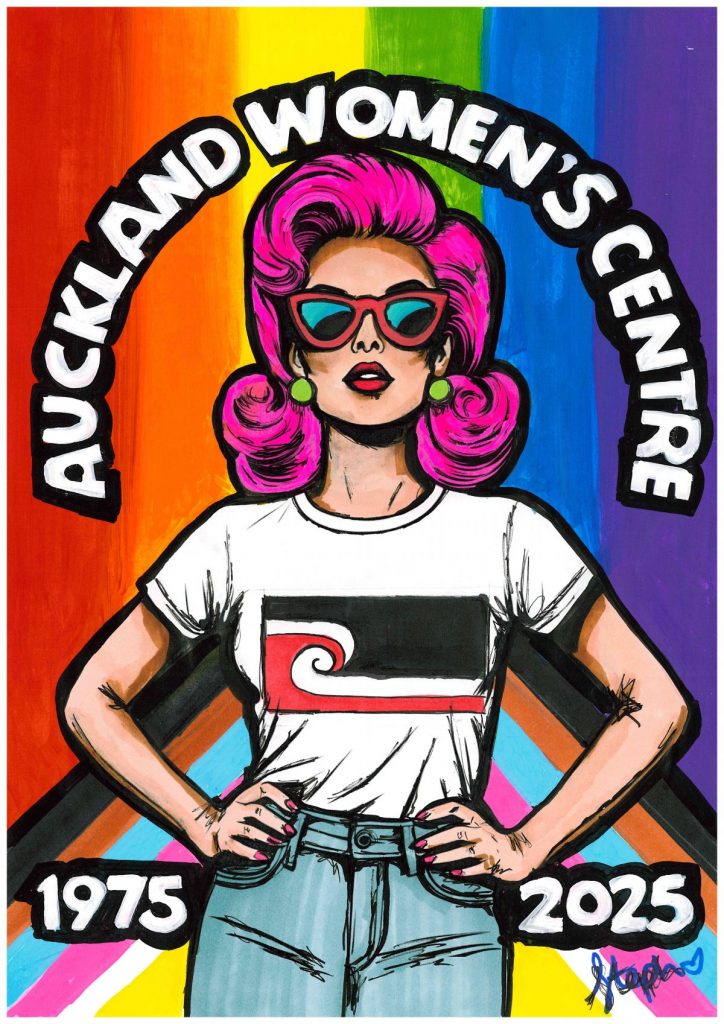The New Fight for Feminism
Auckland Women’s Centre is turning 50. Janet McAllister asks: Do they dare celebrate amid current threats to women’s rights?
The below article as originally posted on the NZ Herald. Find it here
“Every day I’m like…. ‘Shame on your undies, why are you doing that?’ You can’t just say ‘we don’t care about equity’. That means you don’t care about humanity.”
Boom. That mic-drop quip was from public health physician Dr Elana Curtis at a recent community kōrero organised by Auckland Women’s Centre (where I work a few hours a week). She was talking about the government’s appalling blocks to health equity between Māori and non-Māori, but her eloquence also describes (for example) the government’s appalling blocks to pay equity between differently-gendered industries. The unflagged, undemocratic policy reversal is set to steal nearly $13 billion over the next four years from low-paid women, their co-workers and their families. Shame on your undies.
So nurses and teachers are striking, and we’re all invited to a Woman’s Day of Action on [Saturday 20 September], the day after Suffrage Day (see you there!). Meanwhile lower-profile government attacks on women are also causing damage – some fuelled purely by bigotry, not budgets. While accused rapist influencer Andrew Tate and his ilk are normalising youth misogyny, Erica Stanford’s Ministry of Education has removed perhaps the key tool of primary violence prevention from circulation – the country’s gold-standard 2020 guidelines for relationships and sexuality education. This has left schools without guidance to teach and normalise respect, consent, self-esteem and healthy relationships.
Replacement guidance is in the works but it erases all mention of te ao Māori (sound familiar from Stanford?). Plus – aping cynical right-wing politics globally – it removes all mention of trans people and diverse gender identities. Such tacit intolerance is acutely dangerous for the targeted communities, and is also terrible for cis women: I don’t want gits judging whether I’m “feminine” enough to use the public loos.
So the proposed abusive, disrespectful changes are the opposite of evidence-based violence prevention. Discrimination – against Māori, against trans and non-binary people – in relationships education will lead to further violence against women. Shame on your undies.
Elsewhere, the Minister of Family Violence and Sexual Violence Prevention, Karen Chhour, is cutting frontline support for victim-survivors (North Shore Women’s Centre is to close in November – a huge blow). Chhour also recently disbanded Te Pūkotahitanga, the government’s key Māori leadership group on violence prevention. Tangata whenua responded to this extreme, destructive move by taking back the gifted name of “Te Puna Aonui” from the government’s violence prevention unit, while multiple sector organisations (including the Auckland Women’s Centre) declared reduced confidence in the Crown’s commitment to violence prevention.

If you care about our country – whatever your gender or ethnicity – it is rational to feel chronically in shock – numb or reeling – right now. Many of the government’s destabilising attacks are without precedent; they target the nation’s near-consensus about how the world works and should work. Research shows the vast majority of New Zealanders want people – whatever their gender – to be able to live and let live in a just, supportive, polite and non-violent society based on te Tiriti o Waitangi (which generously permits non-Māori to live here) – the proverbial “level playing field”.
As tempting as it is to crawl under a rock, that’s too lonely. Instead, try encouraging others (a quick note of admiration to a tall poppy can boost their stem strength). Put your money where the loudmouths are: it’s getting tougher out there, but crowd-funding means independence – or even survival.
Auckland Women’s Centre is turning 50 this year. Fifty years of friendly feminists offering community, creative classes and crisis support. But dare we celebrate, amid sustained attacks on women? Absolutely. To quote another of the Centre’s kōrero guests, Professor Tracey McIntosh, we “have to have emotional states of hope, we have to have joy, we have to work in our collectives and be well” – even when it feels inappropriate. Hope and community turn worry into action.
The Centre is delighted to have survived disco, Rogernomics and grunge to reach menopause. We’re pleased to have helped smash several waves of feminism into the patriarchy for half a century, by standing up for women’s rights to health care, abortion, safety, family support and to love who we choose. Currently, we’re spearheading a successful push to make stalking a crime – hopefully supported by public information campaigns, specialist victim advocates and robust police training.
Watch our wonderful speakers from our Kōrero here as they share their insights, experiences, and stories that inspire and inform.
